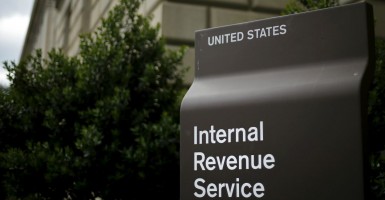After nearly 30 years of a virtually unchanged tax system, Americans are calling for a reform to the outdated system.
As a result, a group of experts identified several problems with the current tax system and proposed new solutions for modern tax reform at The Heritage Foundation on Monday. These experts came to a conclusion: the current tax system is complex, and it benefits no one.
“Tax policy discriminates against every person,” said Alvin Rabushka, a David and Joan Traitel senior fellow at the Hoover Institution and one of the primary architects behind the flat tax. “We have a tax code that is the very essence of discrimination.”
Rabushka and other panelists agreed that the current tax system is not simple, costly or fair to Americans. In crafting a new tax system, Jason Fichtner, senior research fellow at the Mercatus Center, said that the reforms should be simple, equitable, efficient and predictable.
As a result, the panel advocated for a consumption tax—meaning taxes would be implemented upon consumed goods and services rather than saved income.
Under the current tax system, saved income has the potential to be taxed multiple times, which inherently favors those who spend their money rather than those who save it.
“Every single economic theory is based on the notion that you have to defer some of today’s consumption to finance tomorrow’s growth. You have to have what some economists call capital formation,” said Daniel Mitchell, senior fellow at the Cato Institute. “And yet, our tax system … mistreats and abuses the people who save and invest.”
In order to promote these qualities, two primary solutions were addressed: Rabushka’s flat tax plan and a national retail sales tax.
Under Rabushka’s flat tax, income is first taxed prior to investment. Under this flat tax proposal, all income would be taxed once at a uniform rate of 19 percent.
However, Steve Hayes, chairman and president of Americans for Fair Taxation, said the best way to implement a consumption tax would be channeled through a national retail sales tax.
“We’re all talking about taxing consumption,” Hayes said. “I’m talking about taxing consumption at the purest level.”
Hayes said the retail sales tax “makes more sense” than the flat tax because few are confident that the flat tax would remain flat. In contrast, the retail sales tax would be more difficult to alter.
But the common goal can be reached multiple ways—there is no one correct answer.
“There is no one way to get to a consumption tax,” said Curtis Dubay, research fellow in tax and economic policy at The Heritage Foundation. “You can get there a lot of different ways.”
Dubay compared the various proposals to different forms of software—it accomplishes the same feat but caters to different interfaces.
The U.S. tax system has not been reformed since 1986. Other common proposals for tax reform include a business transfer tax, which is a consumption tax collected at the business level, and an expenditure tax, which taxes gross income without taxing savings and investment.






















